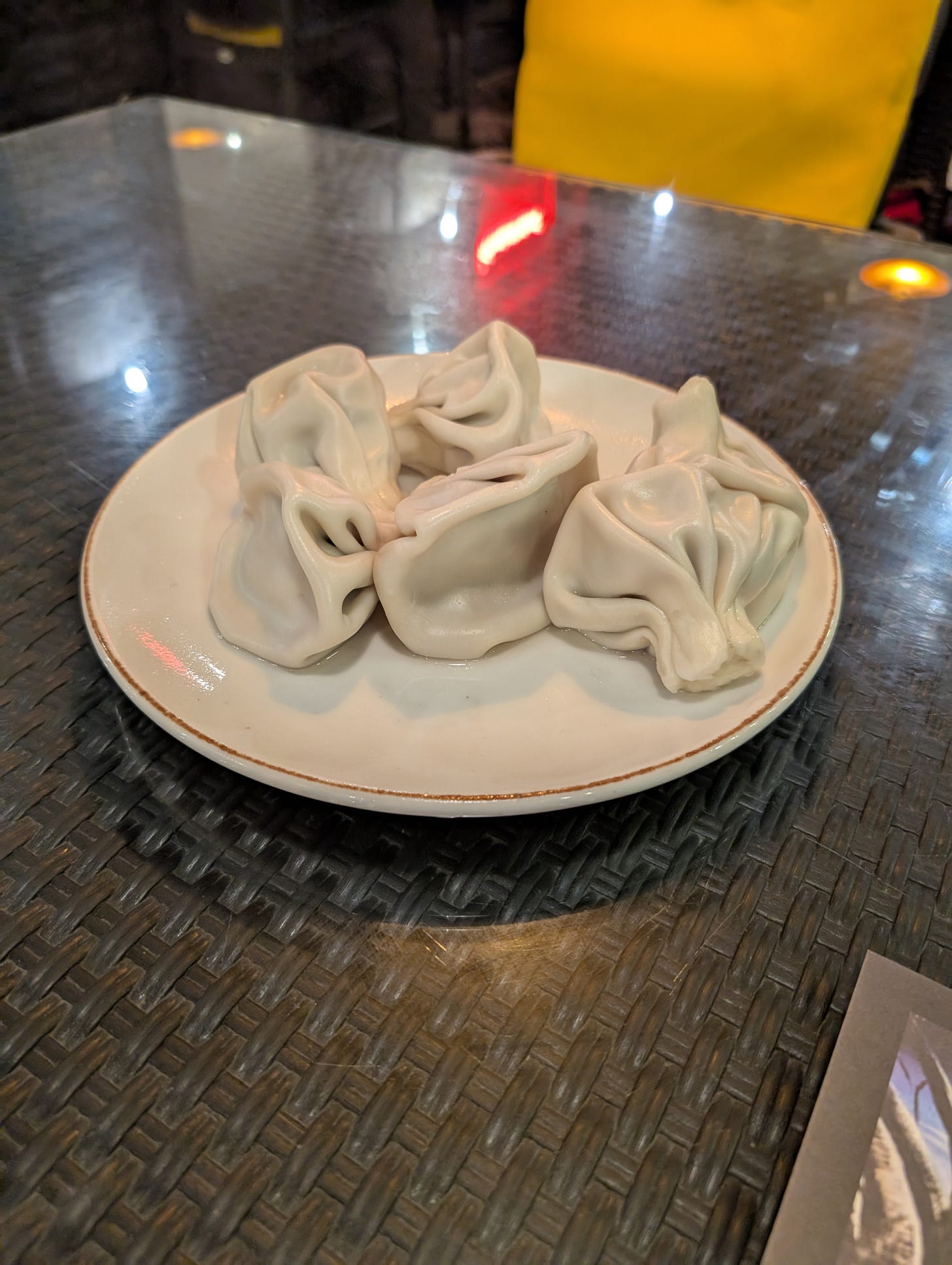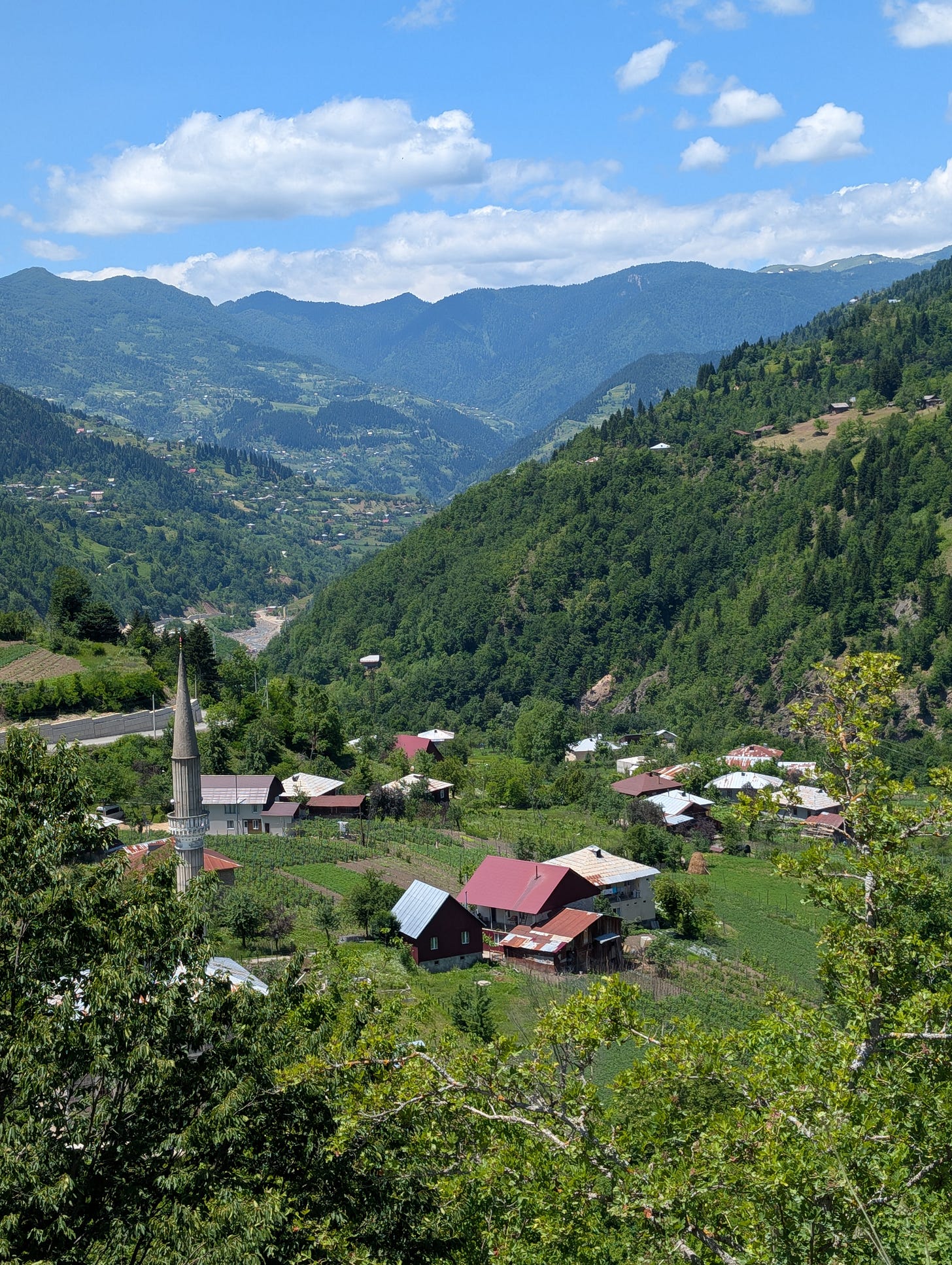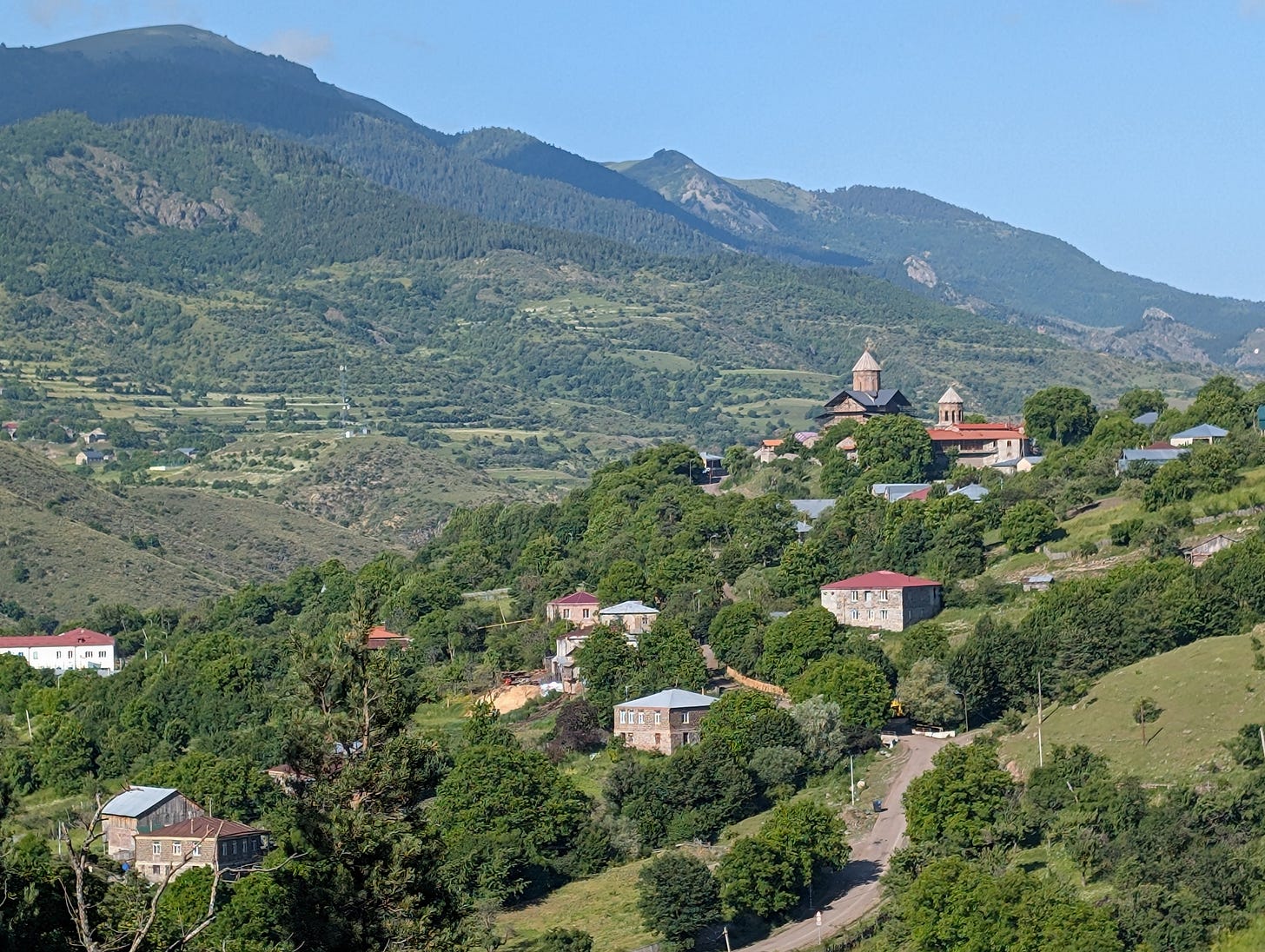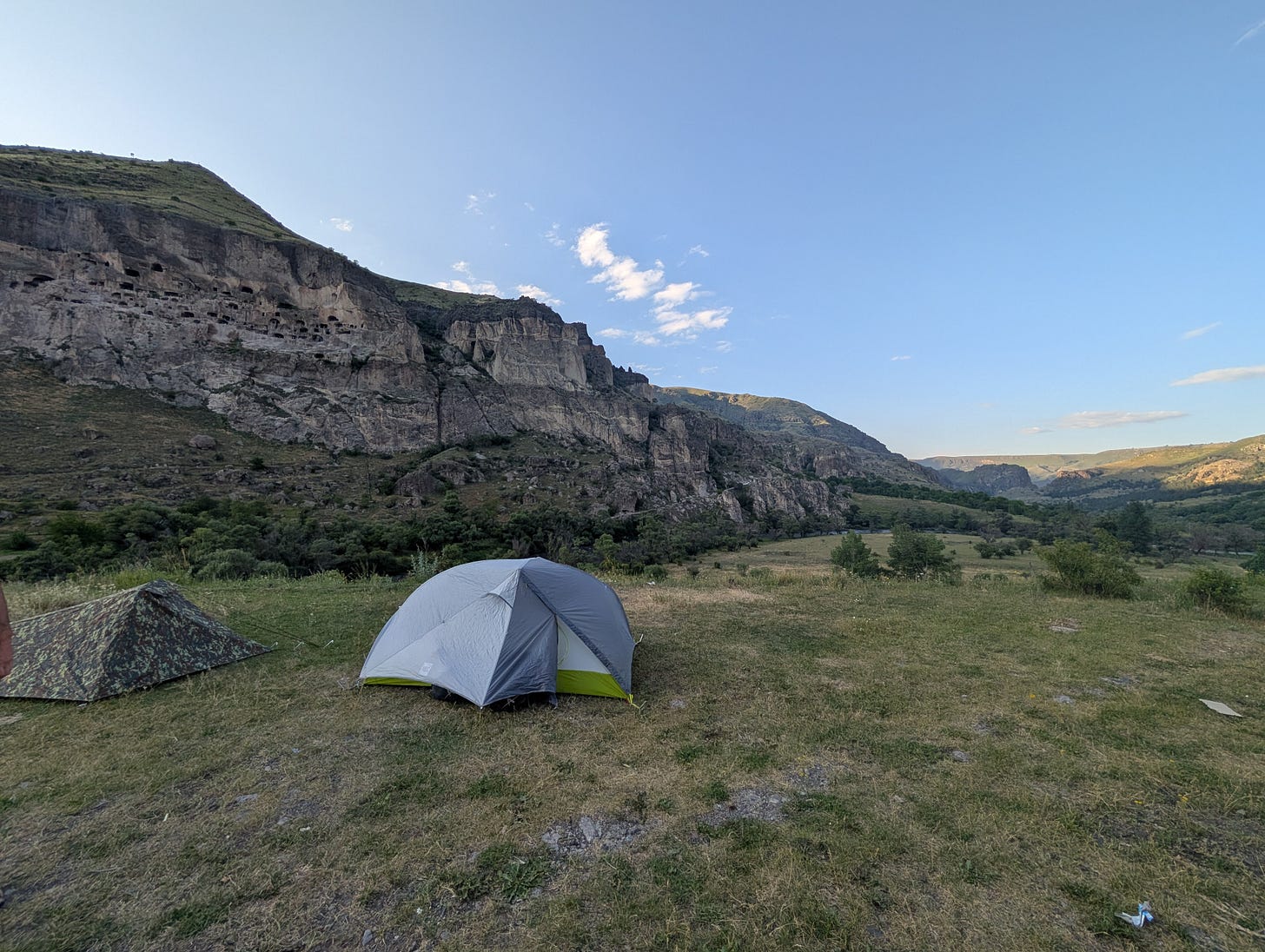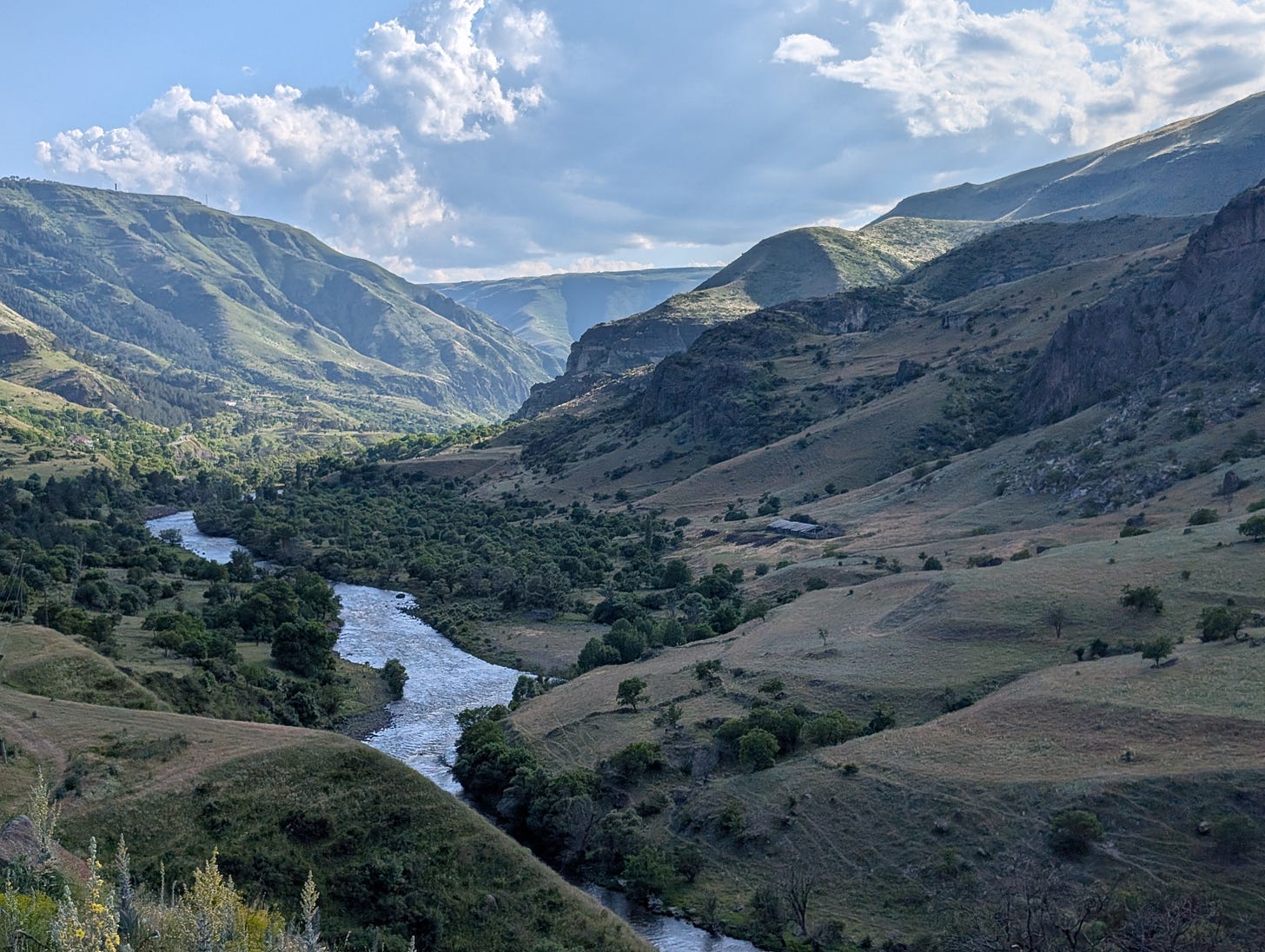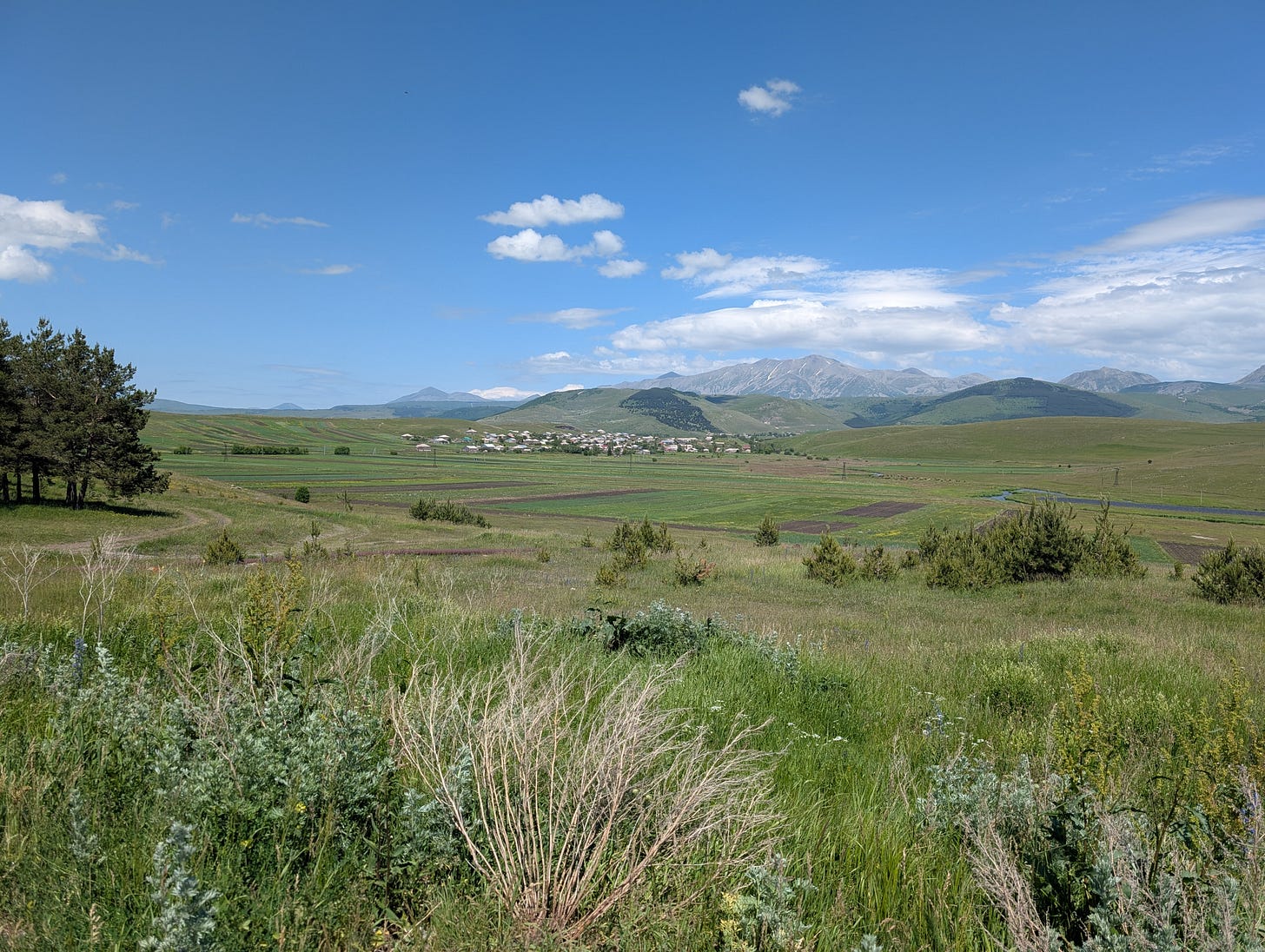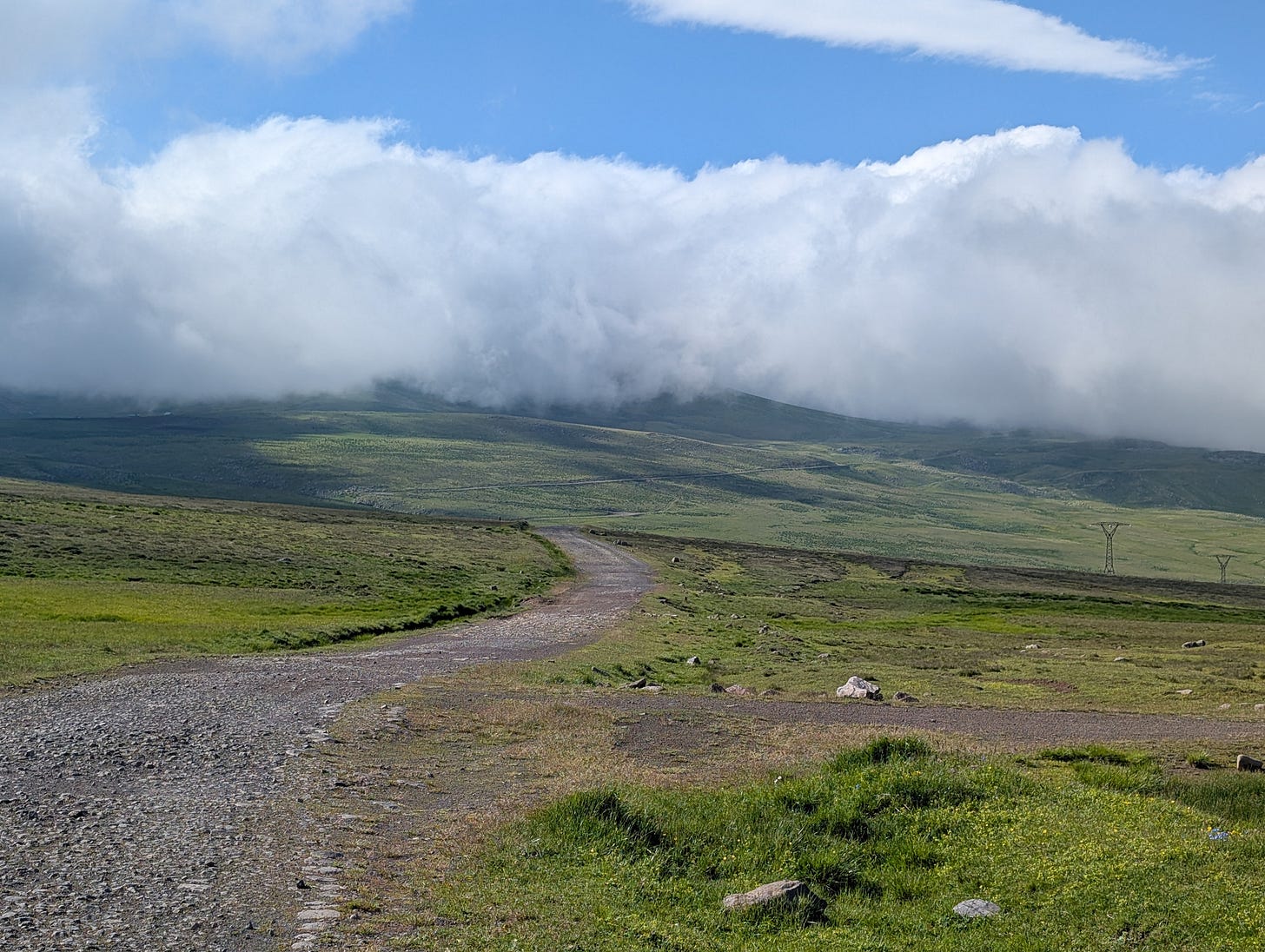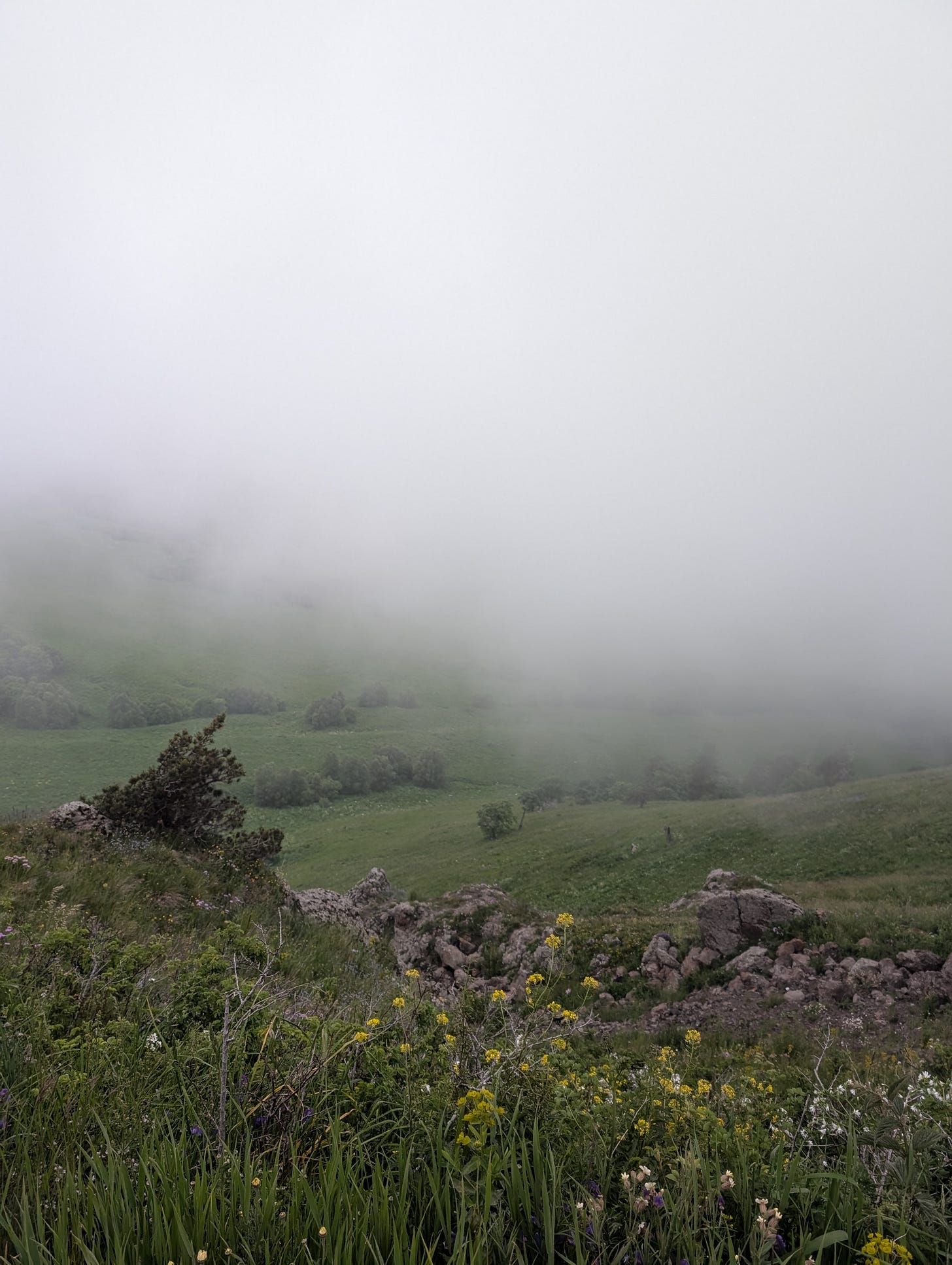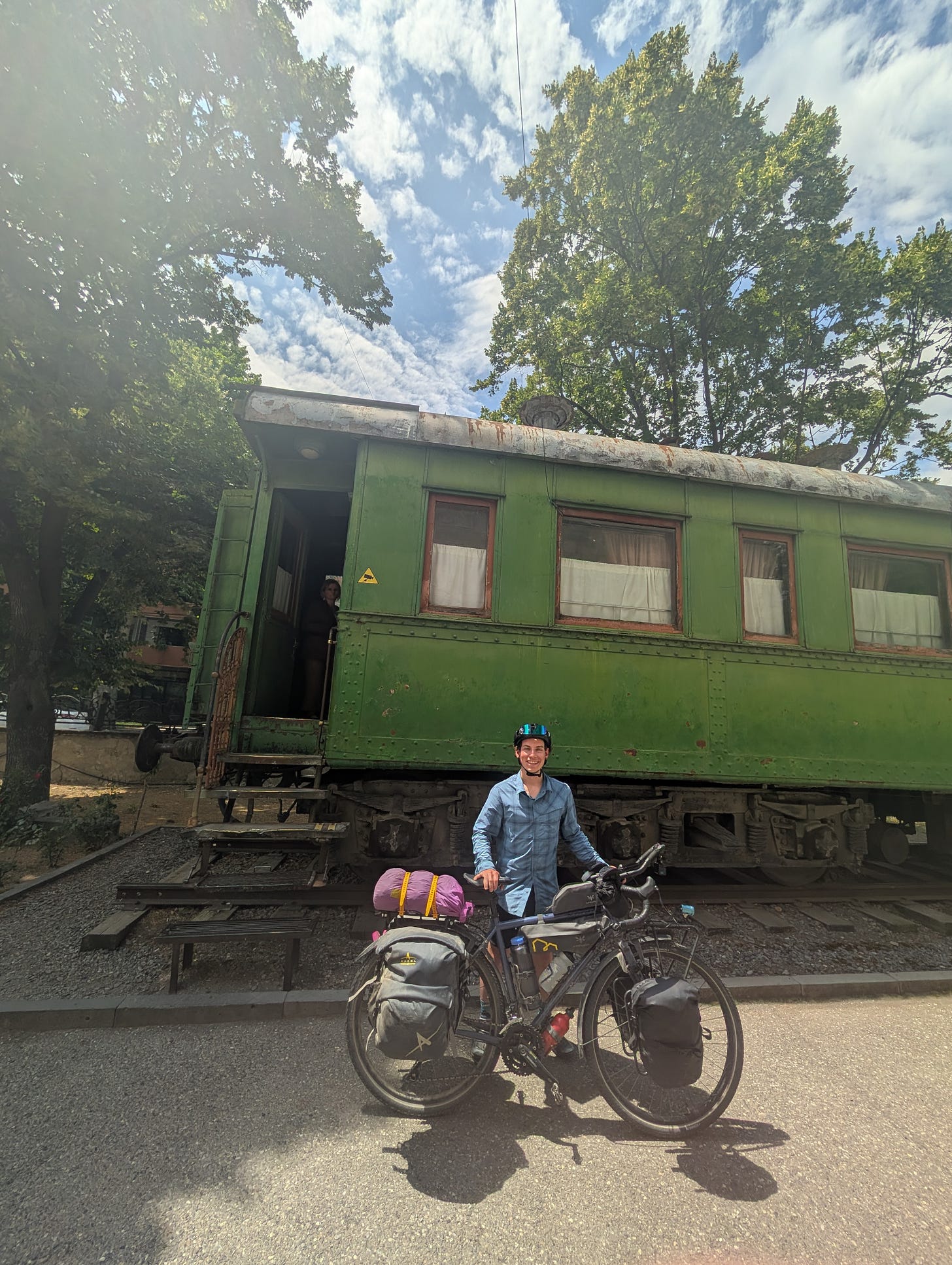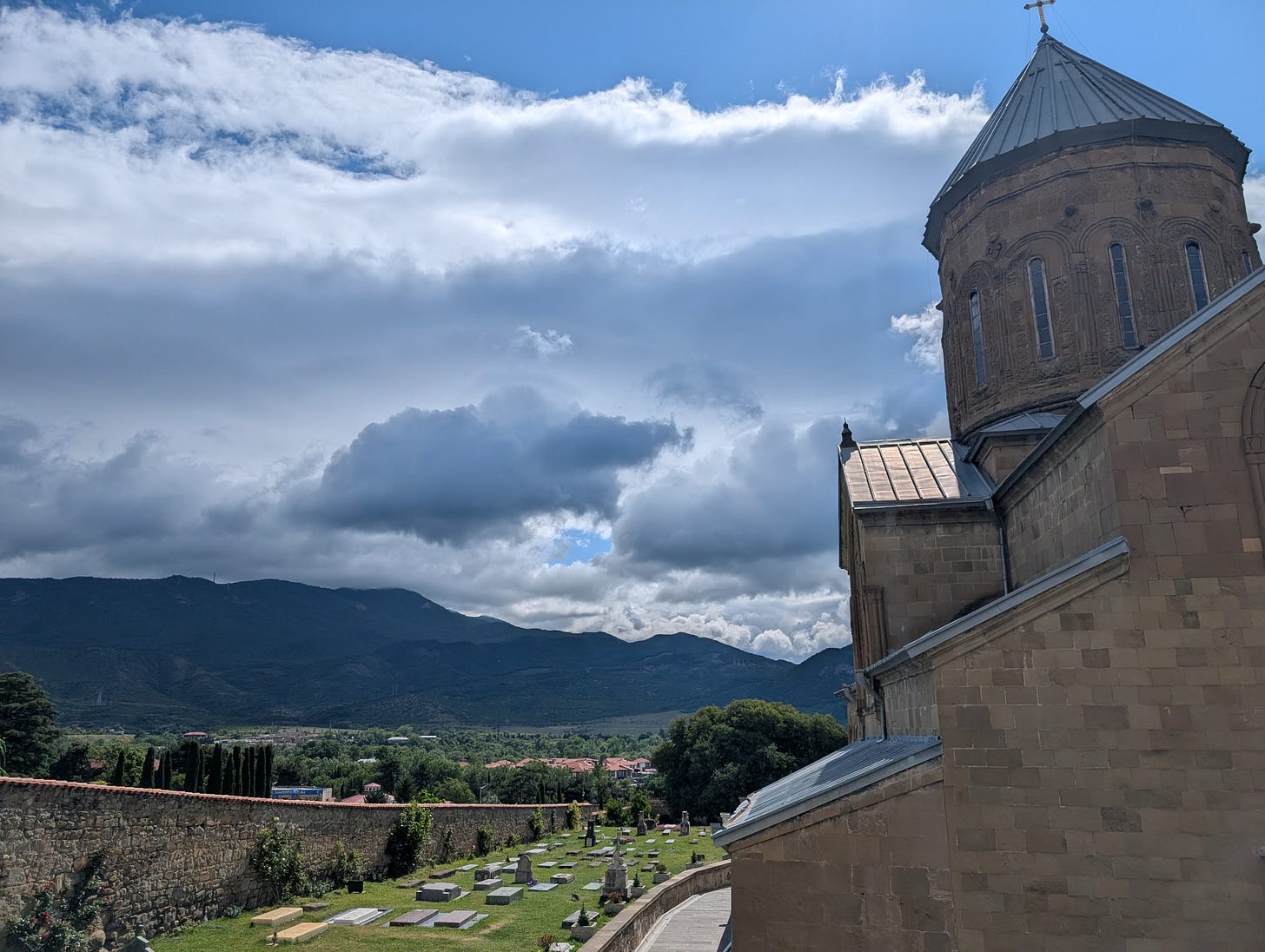Card 6: Batumi to Tblisi
A highly inefficient and emotionally confused route, powered by Khachapuri.
As promised, a return to an overly-documentary play-by-play regurgitative style. Predictably I’m three weeks late. Somehow, this one was hard to write, I’m feeling lot of feels about Georgia. Enjoy the pictures if not the writing 🙃
My first week in Georgia began in the very way that it would come to be defined: by one constant, dough and cheese. Khatchapuri.
Though it is not so constant, as each region has it’s own variety. On that rainy day in Batumi, Tim, myself, and our new friend Cenk (a very friendly Turkish guy from Antalya) had one mission, to eat the most famous variety of Khatchapuri — the Adjaruli Khatchapuri from Adjara, the southwest region of Georgia, where we were spoiled enough to be.
Let me tell you, we weren’t disappointed. It’s the perfect cyclists’ food: carbs, protein, high calorie, an oozing salty beautiful mess — just don’t order a large one before riding up a hill.
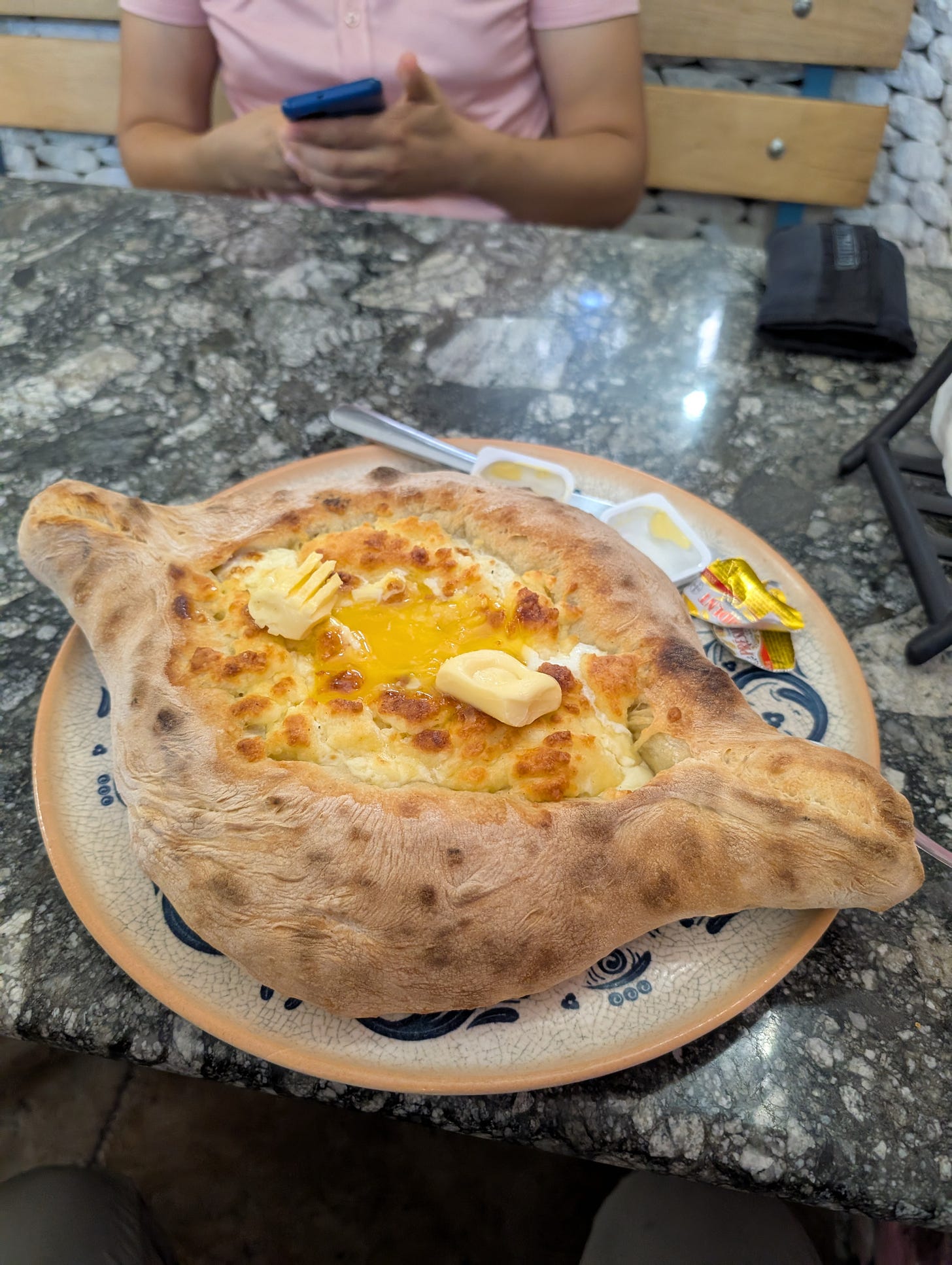
Indeed, the three days spent in rainy Batumi’s startling contradictions were largely devoted to eating. Tim and I, if you recall, had spent many long days in the saddle. I had not actually had any true rest day off the bike since Konya: in Cappadocia, I gravel-biked everywhere, accumulating not kilometers, but meters of elevation gain in the canyons. Good thing we had no other plans, because there is not much to do in the city besides culinary pursuits — which suited me just fine — and gambling, which I’ll leave to those with a few too many rubles lining their pockets.
It was three days of drinking wine (!), sleeping in and of glorying in a new food culture (apologies to Türkiye, but by the end of my sojourn I could barely look at a köfte or kebap). Unfortunately, our time there was not entirely uneventful: Tim’s rear wheel was sadly spaghettified during what should have been a routine rim alignment (at a supposedly-qualified bike shop!).
And so, we parted ways. Tim continued on to Kutaisi, to a better bike shop, to a bike box, to a flight, to an impromptu group diving expedition in Indonesia. And I found myself on the road again, alone, in front of a gas station after a late 2PM start, poring over maps and debating my route forward. Last minute you ask? Indeed: unnecessarily subjecting myself to decision stress is one of my great specialties.
I decided to continue east, charting a course up the river valley towards Khulo, prepared for anything, but completely unsure of what lay ahead. After my short time in Batumi, I was itching to see the countryside, the real, the less manicured side of the country. The only directive I had for myself was to interact as much as possible with locals. Eat the food. Stay at a farm. Get adopted. Learn the language… Put me on the line, Chef!
Of course, it only took an hour of riding before I ran into Pierre, a French cyclist going the same direction — followed swiftly by Henrik, a Dutch roadie cyclist bikepacking with a seat-pack and a backpack on 25mm tyres and rim breaks.
We made a somewhat haphazard trio. The kind where each has different priorities and styles of travel, but where the necessities of the road had funneled us on the same course, with the same options to contend with. Pierre preferred wild-camping and camp food, Henrik preferred cheap hotels and restaurants (on account of his lightweight setup), and I was somewhere in between, but was pushing quite hard for chatting up locals to see if we could land an invite. We ended up camping in a beautiful river bend (Henrik scouted ahead to the next village for some food before returning to camp).
The next morning, after an early lunch in Khulo (you guessed it, Khatchapuri… but also some Ostri), a language lesson with the local French teacher, and a confusing conversation with a group of older village men already half in the bag (“chacha” one of them said, making the universal sign for “drinking” and pointing at his friend), we set off to start the business of getting over the pass, out of the lush coastal region of Georgia, and into the plateau of the Lesser Caucasus.
If we had our quirks as a group, it didn’t affect our ability to actually ride together. And in my case, I started tasting some of the pepper Georgia would later serve up in platters-full (and not just on its delicious Khinkali): beautiful tarmac roads will turn to hard earth and gravel with no warning.
“4 more kilometre! 4 more kilometre!”
This was repeated to us by the laborers when we asked how much more chunky service road gravel we had ahead. Except they told us this every two kilometers.
After climbing on bone-chattering, uneven beaten earth for at least 10 kilometers, we finally found the tarmac again, and could start to savour the surroundings. We were high in the alpine, the blue haze of the June day gave an iridescent sheen to the surrounding mountains, and the colourful wooden cottages of the montane villages popped against the green of the pastures. We saw many signs for guesthouses along the way, which confused us until we climbed higher, and the glass peaks of a giant ski resort lodge became visible as we rounded the steep switchbacks.
After a gargantuan push to the top, a (mercifully) brief stop at possibly the most disgusting toilet I have ever used, and a mechanical maintenance interlude for Pierre, we began our descent down the other side, which we knew would be the rain shadow. As the landscapes changed to a dry subalpine forest, and finally to rolling pasture land, we played the game to see how long we could avoid pedalling (10km was the max). Unfortunately that luck ran out, being forced to climb again briefly, and then contend with a section of switchbacks hewn in rough rock and dirt, where the former asphalt road had been wiped out by a landslide. There was a nice view though, replete with the spire of a monastery, marking the first vista that corresponded to whatever pre-conceived image of Georgia I had in my mind.
The rest of the evening, we fought the rolling terrain of golden wheat fields. We were exhausted, and even Pierre agreed it would be best to share a cheap hotel room. So we pushed to Akhaltsikhe, haggled for a room, ate food, slept.
After a lovely breakfast prepared by the hotel proprietor, poking around the castle (entirely renovated in the early 2000s in order to look as it had in its heyday), we crawled our way up the beautiful canyon floor to Vardzia. I say crawled, because though the road was well paved, and the distance relatively short (60km) and the elevation gain negligible, I felt like I could barely make it. To put it bluntly, I was exhausted, hungry (we hit a stretch where all the restaurants and markets were closed, and the proprietors somewhat rude about us leaning our bikes against the wall…), and in a bad mood. As a group, our inability to make a coherent decision due to our different priorities was also getting on my nerves. I was snapping. When we got to Vardzia, riding in the golden light scattering off the canyon walls and into the cave dwellings of the ancient monastery, I put my bike (and foot) down, and simply refused to go look for a different campsite than the perfect one that us and many other campers had easily found (see picture below). One closing restaurant, a glass of wine hastily poured into an empty coca-cola bottle as a take away container, and another khatchapuri later, I was sleeping angrily under a starry sky in front of an ancient city in the rock.
Whether I knew it at the time or not, that day instigated a low mood that would stay with me for the next two weeks in Georgia. Perhaps it’s the natural result of pushing oneself for weeks, but I would have difficulty enjoying what was in front of me, constantly looking for something over the hedgerow. I won’t dwell on it here, as I’ve had time since to reach the conclusion that since I had not had any expectations for my time in Georgia, I should not have acted disappointed with anything I did, or regret anything I did not. Suffice to say though, that it coloured my decision making, especially for the next few days to Tbilisi.
Waking up in front of the rock dwellings of Vardzia, Pierre was already packing up, having resolved not to attempt the climb out of the valley, which we had determined was a gravel road switching back up the canyon wall. Instead he would backtrack and take the road to Akhalkalaki. So as soon as our trio had started, it was disbanding. Henrik, on his 25mm tires, decided to follow me up the climb, which he did successfully despite the chunky gravel (absolutely madlad).
Cresting onto the plateau, Henrik and I were somewhat stunned at the rolling grassland that awaited us, surrounded by mountain peaks. We rolled on a nice tarmac road, through villages of low ramshackle concrete bungalows and gardens, rusted out carcasses of Ladas, a few kids on bikes. They overwhelmingly had the feeling of frontier towns — which of course they are, up at 1800m altitude and only kilometers from the Turkish and Armenian borders. And like in a western flick where the protagonist rides through town, we got strange stares from locals (and a few close passes from cars) and did not entirely feel welcome.
When we made it to the larger settlement, Akhalkalaki, we stopped to eat shawarma (tasty, but not really the local fare I was craving), and both spent perhaps an hour looking at maps. I think, ultimately, we both had the same feeling: while it was beautiful on the high plateau, this was not the Georgia we had come to see, nor the one we felt welcomed in. Henrik resolved to do a detour into Armenia. For my part, I had the visceral need to see the heartland of the country and its culture. In hindsight, I might been in a bad enough mood that I would have chosen whatever was opposite to what I was doing at the time.
So, whether out of spite or out of an earnest desire for cultural interaction, I charted a route that took me pretty much straight north, over some mountains, and down to the central valley of Shida Khartli. I reckoned that via this route, it would take me at most 3 days to reach Tbilisi. I was looking forward to good food, friendly locals, flat riding.
What I encountered was more mixed.
Let’s start with the last one — topography. I previously mentioned the propensity of main roads to turn rough without warning. Well, the main road I was following, as it snaked up a broad (and frankly, beautiful) grassy mountain slope to take me out of the plateau, turned to a horrible mix of gravel and cobblestones and rammed earth that constantly forced me to change sides of the road, looking for a less bumpy line. Weather rolled in as I climbed higher. It got cold, and fog surrounded. I sent many check-in messages, as I wasn't sure if or when I would lose service. I only saw three other people in that all-encompassing fog: a shepherd and his flock, and two policemen at the top of the pass who checked my passport as I pulled on a coast and leg warmers. The descent was slow-going, a set of dirt virages hanging on a cliffside in the fog, so deeply gouged by truck tires that it felt like a pump track. Thankfully it did go on forever, passing the ski resort Bakuriani and turning into a beautiful asphalt main road once again, swishing me on a magic carpet down, down, down, down, down, in the evening light to Borjomi, nestled in a river valley. I stayed in a Soviet-era hostel, a relic from the past, in a town that is a relic of Tsardom and CCP days, yet still popular with tourists for its thermal springs. It was pretty nice, reminding me a bit of a tiny post-Soviet Banff — and yes, it had good food.
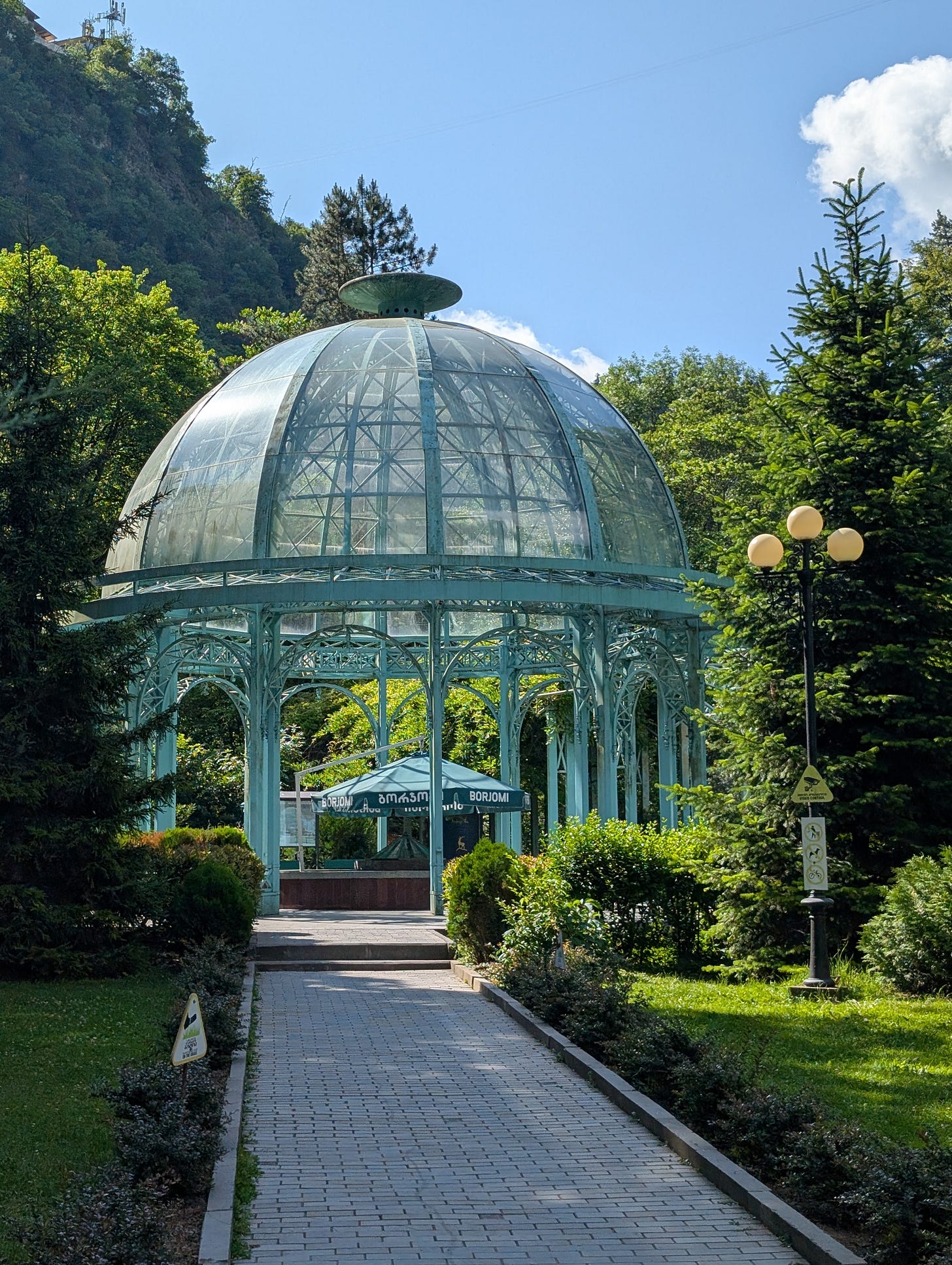
As I descended out of the mountains and into the wider valley, things just kept grating at me. I had a headwind as I descended. I got run off the road a few times by maniacal drivers. The food options in Khashuri seemed to be summed up as “khatchapuri”. To make things worse, I appeared to have lost my chain lube, and my drivetrain was making a racket. I wanted desperately to interact with locals in the villages I was going through, but there didn’t apear to be any main squares, just a road with houses and gardens enclosed by high walls, and the few people I did see, it felt to me, were not returning my waves, were not engaging when I tried to chat.
The one positive is that I had indeed found the flat — and seemingly for the first time in the entire trip, a strong tailwind. If I couldn’t spend lots of quality time in villages, well then at least riding through them would be pleasant.
And it was. The rolling farm road was relatively quiet, and took me through lovely pasture land framed by dry eroded hills to the north, and lush green mountains to the south. I camped near Gori in a nice little private campground at a tree nursery, meeting and chatting with some caravaners overlanding from Europe. The chats continued in the morning, and after visiting Gori (infamous as the birthplace of Stalin, but offering so much more), and Uplitsikhe (the ancient capital, carved entirely from the rock), attending a wine tasting, and getting routed down a farm road by my mapping software only to have to backtrack to avoid a pack of dogs, I had only done 30km and it was past 5PM. I had to hustle to Mtskheta, where I checked into a guesthouse. I walked around the old town at night, carousing for an open restaurant (it was Sunday, slim pickings, but I somehow managed to avoid imbibing more dough and cheese). It was pleasant to walk the streets alone, and rightly so since the next morning, as I was leaving to commute the 25km to Tbilisi, the cobbles were clanking with the shoes of tourists getting off buses to walk to the three monasteries in town.

The ride into the city was hectic. Think defensive maneuvering, craning my neck to shoulder-check, and pushing hard to go slightly closer to the speed of traffic (trust me, it somehow makes it easier to navigate). When I eventually made it to Green House Hostel (a very well deserved shoutout; stay here if you’re in Tbilisi), I was excited to drop the bike and just walk around.
Even with the benefit of hindsight, my feelings on this week are still quite mixed. I don’t want to give Georgia a bad look. On the contrary, I love the country, and I want to go back, albeit maybe with hiking boots instead of a bicycle. Unfortunately, I think it was just one of those extended funks that would have affected me regardless of where I was. The next week (once again with the benefit of hindsight) would prove to be much more satisfying, though my morale still wouldn’t be where I’d like it to be. But that’s a story for next time.
For now, I’ll leave you with a suitably undercooked gastronomy metaphor. That evening I met up with Bryce and Ash, a cameo from the Cappadocia episode a few weeks ago. They were cooking up a plan to go to the mountains, and I was eager to spice it up a bit as well. That night, there certainly was a khatchapuri on the table. But there were also fragrant chashushulis, creamy garlicky shkmeruli, sizzling ojakhuri, aubergine walnut spreads, good bread and wine. We toasted to the food, we toasted to the country, and toasted the adventure to come.
Highlights
In no particular order…
The cuisine. I joke about how much khatchapuri I ate, and its not a lie — the most easily available calories are a bunch of cheesy bread varieties. By the end, I definitely was tired of it. Hell, I just used it as a framing device and extended metaphor for a writing piece about how expectations can turn experiences sour. However, from the beginning I was eating other things. The sheer variety of dishes in Georgian cuisine was a joy. Many are meaty stews, but just as many are vegetable-based side dishes. Oh and don’t get me started on the Khinkali, big soup dumplings that will burn your palette off if like you lack the patience to resist digging into them.
The landscapes: regardless of my (lack of) interactions with locals this week, one positive constant was the sheer beauty of the place.
Crossing the mountains from Akhalkalaki to Borjomi: I wrote about it above, but truly this ride was wild.
Lessons Learned
Expectations are the thief of joy. I did lots of really cool things this week, but I let my stubborn pursuit of other things cloud my enjoyment. Have the clarity to see the positives for what they are and be grateful for them. The moment I dropped these expectations is the moment they started being fulfilled (stay tuned for next week).
Don’t trust a line on a map out of hand: with the marvel of technology and GPS mapping services, I can know about the surface types before setting out. Use this to my advantage, and prepare accordingly.
Conversely: do trust a line on a map, it probably goes somewhere cool.
Stats
Batumi to Shuakhevi: 65km, 662m elev. https://strava.app.link/kVQ74O6VUUb
Shuakhevi to Akhaltsikhe: 103km, 2163m elev. gain. https://strava.app.link/JuMIaWcWUUb
Akhaltsikhe to Vardzia: 61km, 717m elev. https://strava.app.link/ERObopeWUUb
Vardzia to Borjomi: 119km, 1546m elev. https://strava.app.link/nxvO8UlWUUb
Borjomi to Skra: 81km, 389m elev. https://strava.app.link/zN7EW5qWUUb
Skra to Mtskheta: 87km, 649m elev. https://strava.app.link/lXZQqwuWUUb
Mtskheta to Tbilisi: 29km, 174m elev. https://strava.app.link/6Bijk8yWUUb





